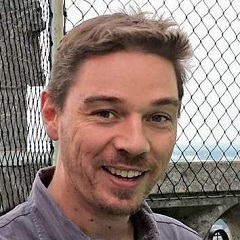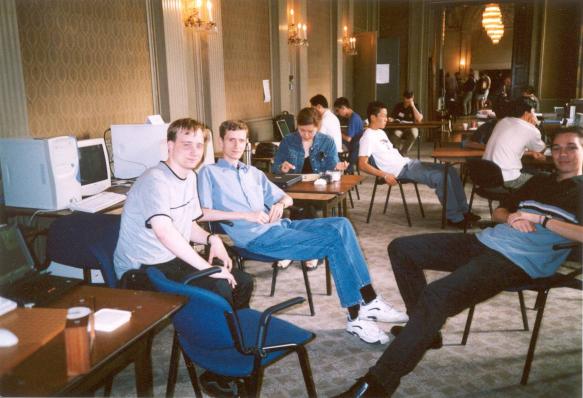Difference between revisions of "Erik van der Werf"
GerdIsenberg (talk | contribs) |
GerdIsenberg (talk | contribs) |
||
| Line 10: | Line 10: | ||
using [[Iterative Deepening|iterative deepening]] [[Alpha-Beta|alpha-beta]] search ([[Principal Variation Search|PVS]]), with [[Transposition Table|transposition tables]], [[Enhanced Transposition Cutoff|enhanced transposition cut-offs]], | using [[Iterative Deepening|iterative deepening]] [[Alpha-Beta|alpha-beta]] search ([[Principal Variation Search|PVS]]), with [[Transposition Table|transposition tables]], [[Enhanced Transposition Cutoff|enhanced transposition cut-offs]], | ||
two [[Killer Move|killer moves]], [[History Heuristic|history heuristic]], Benson's algorithm for unconditional [https://en.wikipedia.org/wiki/Life_and_death live] <ref>[https://senseis.xmp.net/?BensonsDefinitionOfUnconditionalLife%2FVersion20100208 Benson's Definition of Unconditional Life / Version 20100208 at Sensei's Library]</ref> <ref>[[David B. Benson]] ('''1976'''). ''Life in the Game of Go''. [https://en.wikipedia.org/wiki/Information_Sciences_(journal) Information Sciences], Vol. 10, [https://webdocs.cs.ualberta.ca/~games/go/seminar/2002/020717/benson.pdf pdf]</ref>, and domain specific evaluation heuristics, futher elaborated in his Ph.D. thesis and [[ICGA Journal]] papers. | two [[Killer Move|killer moves]], [[History Heuristic|history heuristic]], Benson's algorithm for unconditional [https://en.wikipedia.org/wiki/Life_and_death live] <ref>[https://senseis.xmp.net/?BensonsDefinitionOfUnconditionalLife%2FVersion20100208 Benson's Definition of Unconditional Life / Version 20100208 at Sensei's Library]</ref> <ref>[[David B. Benson]] ('''1976'''). ''Life in the Game of Go''. [https://en.wikipedia.org/wiki/Information_Sciences_(journal) Information Sciences], Vol. 10, [https://webdocs.cs.ualberta.ca/~games/go/seminar/2002/020717/benson.pdf pdf]</ref>, and domain specific evaluation heuristics, futher elaborated in his Ph.D. thesis and [[ICGA Journal]] papers. | ||
| + | |||
| + | =Photos= | ||
| + | [[FILE:magog_team_smaller.jpg|none|border|text-bottom|640px|link=http://erikvanderwerf.tengen.nl/magog.html]] | ||
| + | The [https://www.game-ai-forum.org/icga-tournaments/program.php?id=137 Magog] team at the [[7th Computer Olympiad#Go9x9|7th Computer Olympiad 2002]]. [[Mark Winands]], [[Levente Kocsis]], [[Erik van der Werf]] <ref>[http://erikvanderwerf.tengen.nl/magog.html MAGOG]</ref> | ||
| + | |||
| + | =See also= | ||
| + | * [[Enhanced Forward Pruning]] | ||
| + | * [[Relative History Heuristic]] | ||
| + | * [[Jaap van den Herik#Video|Jaap van den Herik Interview]] at the [[12th Computer Olympiad#Go|12th Computer Olympiad]] June 2007 | ||
=Selected Publications= | =Selected Publications= | ||
Revision as of 23:05, 2 November 2019
Home * People * Erik van der Werf

Erik van der Werf,
a Dutch computer scientist, principal scientist in the hearing aid industry, and master level Go player [2].
He received a M.Sc. degree in applied physics from Delft University of Technology in 1999, and defended his Ph.D. thesis on artificial intelligence for the game of Go at Maastricht University in 2005 under supervision of Jaap van den Herik and Jos Uiterwijk.
Erik van der Werf is author of the Go playing programs Magog (started with Levente Kocsis and Mark Winands) [3], Steenvreter [4] and GridMaster [5].
His Mini Go Solver Migos solved 5x5 Go in 2002 [6],
using iterative deepening alpha-beta search (PVS), with transposition tables, enhanced transposition cut-offs,
two killer moves, history heuristic, Benson's algorithm for unconditional live [7] [8], and domain specific evaluation heuristics, futher elaborated in his Ph.D. thesis and ICGA Journal papers.
Contents
Photos
The Magog team at the 7th Computer Olympiad 2002. Mark Winands, Levente Kocsis, Erik van der Werf [9]
See also
- Enhanced Forward Pruning
- Relative History Heuristic
- Jaap van den Herik Interview at the 12th Computer Olympiad June 2007
Selected Publications
1999
- Erik van der Werf (1999). Non-linear target based feature extraction by diabolo networks. Masters thesis. Pattern Recognition Group, Department of Applied Physics, Faculty of Applied Sciences, Delft University of Technology, pdf
2000 ...
- Erik van der Werf, Jaap van den Herik (2001). Visual Learning in Go. 6th Computer Olympiad Workshop, pdf
- Erik van der Werf (2002). GO4++ wins 9x9 Go tournament. ICGA Journal, Vol. 25, No. 3 » 7th Computer Olympiad
- Erik van der Werf (2002). Solving Ponnuki-Go on Small Boards. 7th Computer Olympiad Workshop
- Erik van der Werf, Jos Uiterwijk, Jaap van den Herik (2002). Solving Ponnuki-Go on Small Boards. BNAIC’02, pdf
- Erik van der Werf, Jos Uiterwijk, Eric Postma, Jaap van den Herik (2002). Local Move Prediction in Go. CG 2002
- Erik van der Werf, Jaap van den Herik, Jos Uiterwijk (2003). Solving Go on Small Boards. ICGA Journal, Vol. 26, No. 2, pdf
- Erik van der Werf (2003). Aya wins 9x9 Go tournament. ICGA Journal, Vol. 26, No. 4 » 8th Computer Olympiad
- Erik van der Werf, Jaap van den Herik, Jos Uiterwijk (2003). Learning to Score Final Positions in the Game of Go. Advances in Computer Games 10, pdf
- Mark Winands, Jaap van den Herik, Jos Uiterwijk, Erik van der Werf (2003). Enhanced forward pruning. JCIS 2003
- Erik van der Werf, Jaap van den Herik, Jos Uiterwijk (2004). Learning to Estimate Potential Territory in the Game of Go. CG 2004, pdf
- Mark Winands, Erik van der Werf, Jaap van den Herik, Jos Uiterwijk (2004). The Relative History Heuristic. CG 2004, pdf
2005 ...
- Erik van der Werf (2005). AI techniques for the game of Go. Ph.D. thesis, Maastricht University, pdf
- Mark Winands, Jaap van den Herik, Jos Uiterwijk, Erik van der Werf (2005). Enhanced Forward Pruning. Information Sciences, Vol. 175, No. 4, pdf preprint
- Erik van der Werf, Mark Winands, Jaap van den Herik, Jos Uiterwijk (2005). Learning to predict life and death from Go game records. Information Sciences, Vol. 175, No. 4
- Erik van der Werf, Jaap van den Herik, Jos Uiterwijk (2005). Learning to score final positions in the game of Go. Theoretical Computer Science, Vol. 349, No. 2, pdf preprint
- Erik van der Werf (2007). Steenvreter wins 9x9 Go tournament. ICGA Journal, Vol. 30, No. 2 » 12th Computer Olympiad
- Erik van der Werf, Mark Winands (2009). Solving Go for Rectangular Boards. ICGA Journal, Vol. 32, No. 2, pdf
External Links
- Homepage of Erik van der Werf
- Erik van der Werf's ICGA Tournaments
- van der Werf, Erik from computer-go.info
- evdwerf (Erik van der Werf) · GitHub
References
- ↑ evdwerf (Erik van der Werf) · GitHub
- ↑ Homepage of Erik van der Werf
- ↑ Magog
- ↑ About Steenvreter
- ↑ About GridMaster
- ↑ 5x5 Go is solved October 20,2002
- ↑ Benson's Definition of Unconditional Life / Version 20100208 at Sensei's Library
- ↑ David B. Benson (1976). Life in the Game of Go. Information Sciences, Vol. 10, pdf
- ↑ MAGOG
- ↑ ICGA Reference Database (pdf)
- ↑ Publications of Erik van der Werf
- ↑ dblp: Erik C. D. van der Werf
